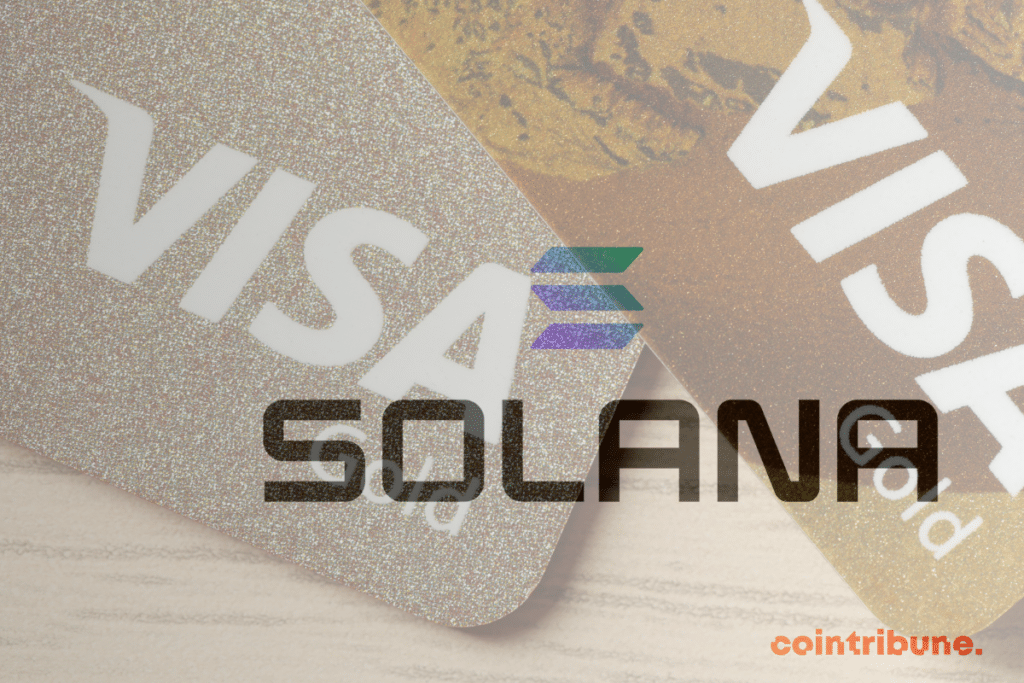Why is Visa betting on Solana to conquer the crypto world?
Visa, the payment services giant, is making cryptocurrencies and the underlying blockchain technology a cornerstone of its growth strategy. In recent months, the company has been actively involved in this direction, with numerous initiatives related to cryptocurrencies. While Visa’s previous crypto-related activities showcased its enthusiasm for blockchain, they didn’t reveal much about the company’s long-term plans. In a recent media statement, Visa clarified its stance on this matter, asserting that Solana’s blockchain is the most relevant in the market to ensure its expansion in the crypto industry. In this article, we will delve into why Visa is banking on Solana’s blockchain.

In brief:
- Visa is betting on Solana’s blockchain for its growth, capitalizing on its high transaction capacity and speed of execution;
- Solana’s affordable and predictable transaction fees are a key factor driving Visa’s interest in the platform;
- With 1,893 active validators and a robust node infrastructure, Solana offers the reliability and scalability that aligns with Visa’s requirements.
Visa’s Attraction to Solana’s Operational Efficiency
Solana’s blockchain stands out as one of the top performers in the crypto industry. Unlike many other blockchains, Solana distinguishes itself with its scalability and speed, attributes that have propelled the platform’s significance in the crypto and decentralized applications (dApps) ecosystem.
These advantages form the primary reason Visa would rely on Solana over similar infrastructures. Specifically, Solana boasts an average transaction execution capacity of 400 cryptocurrency transactions per second (TPS), which can surge to over 2,000 TPS during peak demand periods. This comes with an execution speed averaging between 500 to 600 milliseconds, significantly enhancing user experiences.
This transaction throughput is far from negligible. In fact, Solana demonstrates substantial transactional capacity compared to Bitcoin and Ethereum, which have average TPS of 7 and 12, respectively, relatively low volumes.
For an international platform like Visa, which can process more than 65,000 TPS, Solana evidently emerges as a viable blockchain, at least enough to “test and pilot payment use cases.” Furthermore, Solana’s smart contracts, also known as programs, can execute in parallel through a multithreaded approach.
Visa is Drawn to Solana’s Accessible Transaction Fees
This aspect is likely the most compelling reason that motivated Visa to choose Solana’s blockchain. Indeed, Solana outshines its competitors when it comes to transaction fees. These fees typically amount to less than $0.001, making them affordable for stakeholders.
However, Solana’s transaction fees are not just affordable; they are also predictable. Compared to the transaction costs imposed by Bitcoin and Ethereum, Solana’s fees are unlikely to fluctuate unpredictably.
This enhances the blockchain’s attractiveness, making it “an intriguing option for exploring efficiency gains and cost savings for existing payment operations” on Visa’s platform.
If Solana’s transaction fees are both affordable and predictable, it’s not by chance. This is achieved through localized fee markets introduced by the blockchain’s developers. This innovation, typical of blockchain technology, stems from its transactional capabilities. Its major advantage is alleviating network congestion, which is often the root cause of rising transaction costs that can hinder efficiency.
Lastly, the Scale of Solana’s Validators and Nodes
As of July 31, 2023, Solana’s blockchain had 1,893 active validators, which are entities responsible for producing and voting on blocks. The platform also had more than 925 Remote Procedure Call (RPC) nodes, which, while unable to create blocks, maintain a local record of transactions.
The abundant availability of active validators and nodes is a key advantage of Solana. It ensures the platform’s real-time operational capability, greatly satisfying users. In this regard, only Ethereum can rival Solana, as Ethereum also boasts a substantial number of independent validators.
Conclusion
Solana’s blockchain possesses exclusive technological advantages, combining high throughput, affordability, and robustness, thanks to its numerous nodes and validators. This harmonious synergy makes it a scalable blockchain platform offering compelling payment solutions. This is why Visa has chosen to expand its stablecoin settlement pilot project to encompass transactions conducted on the Solana network. In doing so, the payment services behemoth aims to evaluate Solana’s capacity to meet the operational demands of modern enterprises. According to Visa, with its strengths, Solana is a promising candidate to address the evolving needs of modern finance.
Maximize your Cointribune experience with our "Read to Earn" program! For every article you read, earn points and access exclusive rewards. Sign up now and start earning benefits.
Diplômé de Sciences Po Toulouse et titulaire d'une certification consultant blockchain délivrée par Alyra, j'ai rejoint l'aventure Cointribune en 2019. Convaincu du potentiel de la blockchain pour transformer de nombreux secteurs de l'économie, j'ai pris l'engagement de sensibiliser et d'informer le grand public sur cet écosystème en constante évolution. Mon objectif est de permettre à chacun de mieux comprendre la blockchain et de saisir les opportunités qu'elle offre. Je m'efforce chaque jour de fournir une analyse objective de l'actualité, de décrypter les tendances du marché, de relayer les dernières innovations technologiques et de mettre en perspective les enjeux économiques et sociétaux de cette révolution en marche.
The views, thoughts, and opinions expressed in this article belong solely to the author, and should not be taken as investment advice. Do your own research before taking any investment decisions.